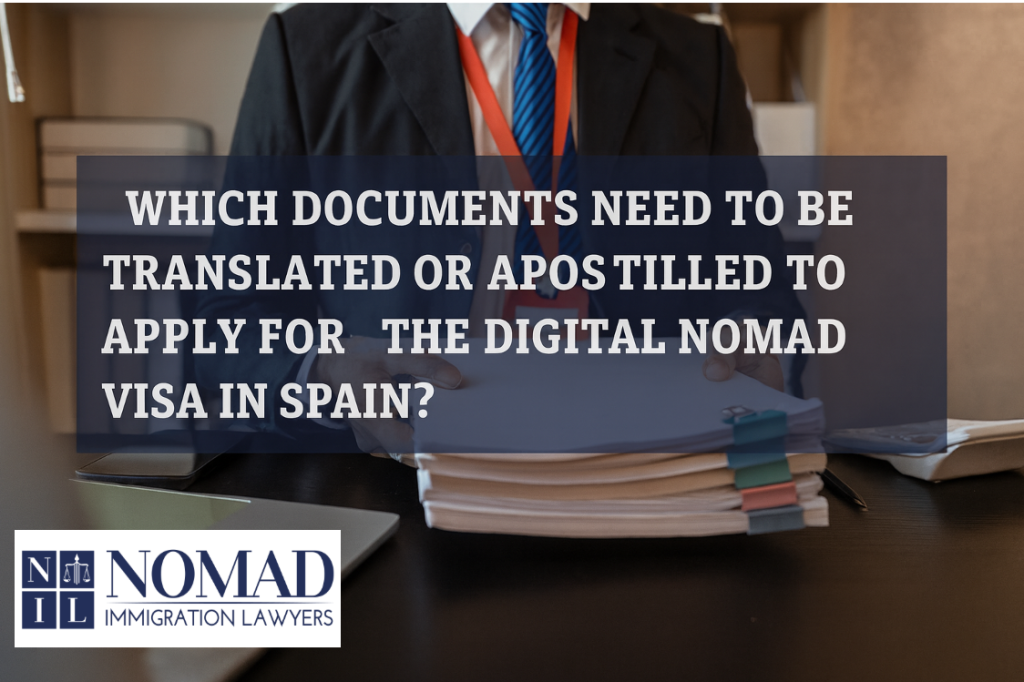Applying for the digital nomad visa in Spain involves meeting a number of formal requirements that not only concern the content of the documents but also their format and validity: legalisation, official translation, issue date, format, etc. One of the most important (and often confusing) aspects is knowing which documents need to be translated into Spanish and which require an apostille to be considered valid by the Spanish authorities.
In this article, we explain in a clear and legally accurate way which documents must be apostilled and which must be officially translated into Spanish.
Want to learn more about the full application process? Read our detailed article “How to Apply for the Digital Nomad Visa in Spain: Step-by-Step Guide”, where we cover financial, professional and administrative requirements in depth.
What Is an Apostille and Why Is It Required?
An apostille is an official certification added to a public document to verify the authenticity of the document, the signature of the issuing authority, their position, and, where applicable, the seal of the issuing institution. This mechanism originates from the Hague Convention of October 5, 1961, which has been adopted by over 100 countries. Its purpose is to simplify the legalization of public documents when they are to be presented in another signatory state.
Thanks to this system, documents issued in one of the signatory countries can be recognized in another without going through a complex chain of consular legalizations, which previously required several steps involving different authorities (notaries, foreign ministries, embassies). It is sufficient for the competent authority in the country of origin to add an apostille, usually in the form of an additional sheet or a stamp, certifying the authenticity of the document.
This is especially important in the context of the digital nomad visa, as much of the required documentation — such as academic degrees, criminal record certificates, tax documents, or client letters — originates from the applicant’s home country and must meet these formal requirements in order to be accepted.
What Is a Sworn Translation?
A sworn translation (also known as an official translation) into Spanish is performed by a certified translator authorised by the Spanish Ministry of Foreign Affairs, European Union and Cooperation (MAEC). These translations include the translator’s certification, signature, and stamp, and have full legal validity in Spain. Here you can find a list of certified translators in Spain.
Documents That Must Be Apostilled for the Digital Nomad Visa
The following documents must be apostilled if issued outside Spain (with exceptions for certain EU documents discussed below):
- Criminal record certificate – Required for all applicants, issued by the country or countries of residence in the last two years.
- University degree or academic diploma – If applying based on formal education rather than work experience.
- Professional experience certificates or tax/social security reports.
- Marriage certificate and children’s birth certificates – Only if applying with dependents (partner or children).
- Certificate of incorporation or existence of the foreign company (Good Standing) – For freelancers working with foreign companies.
Exception: If the documents come from an EU country and are issued as Multilingual Standard Forms under Regulation (EU) 2016/1191, they do not require an apostille, except for criminal record certificates, which do require one even if issued within the EU.
Documents That Must Be Sworn Translated into Spanish
Even if a document is apostilled, if it is not in Spanish, it must be accompanied by a sworn (official) translation. The following documents require such translation:
- Criminal record certificate.
- Certificates of incorporation/Good Standing/Business licence.
- Marriage and birth certificates (if applicable).
- University degree or diploma.
- Employment contract.
- Tax or Social Security certificates showing professional experience.
- Any apostilled document not originally in Spanish.
Documents That Do Not Require Apostille or Sworn Translation
Some documents are exempt due to their nature or format. These include:
- Passport (full copy of all pages).
- Application form.
- Curriculum Vitae (must be submitted directly in Spanish).
- Bank statements and balance certificates.
- Payslips or invoices (normally accepted in English or Spanish).
- A1 or S1 health coverage certificates.
- Affiliation declaration to the Spanish Social Security (if applying as a self-employed worker).
- Client/Employer Letter (It can be written directly in Spanish by your employer/client).
- Declaration of the absence of criminal records.
Occasionally, the UGE-CE (Large Companies and Strategic Groups Unit) may request additional sworn translations, but typically allows a 10-day correction period to submit missing documents.
Practical Tips to Avoid Common Mistakes
- Plan ahead: Some certificates (e.g., criminal records) expire after six months. Apostille procedures can take 1 to 3 weeks depending on the country.
- Check the language of both the document and the apostille: If the apostille is not in Spanish, you must translate both.
- Request apostille-ready originals: Some digital documents aren’t valid unless issued with a recognized electronic signature.
- Check that the sworn translation is done by a certified translator in Spain.
- Digitise all documents: Online submission requires documents to be scanned in high quality and PDF format.
In conclusion, proper document preparation is a critical step in successfully applying for the digital nomad visa in Spain. Knowing which documents need to be apostilled and officially translated into Spanish can mean the difference between approval and rejection.
Although this may seem like just another bureaucratic hurdle, it’s a guarantee of legal certainty for both the applicant and the Spanish authorities.
If you’re unsure whether a document needs an apostille or sworn translation, consult a specialised immigration lawyer. They can review your specific case, verify document validity, and help you submit a complete and compliant application under current regulations.

